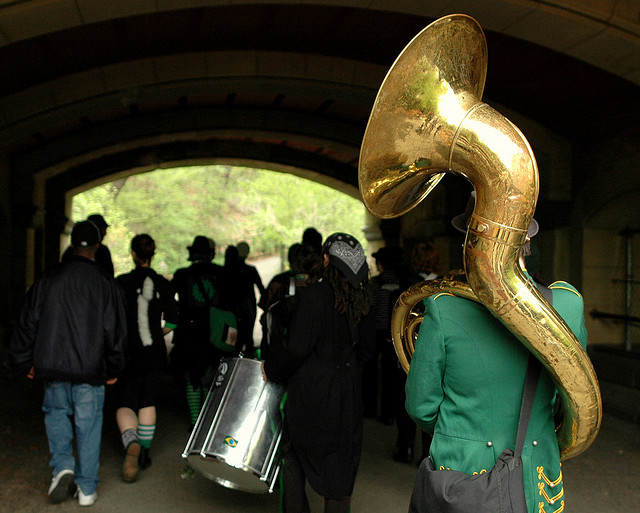I’ll never forget standing among a crowd in a tunnel as the University of Minnesota marching band strode past, row after row of drums thundering, on their way to the homecoming football game.
The noise was so deafening that the rhythm seemed to commandeer my circulatory system, until my heart was pulsating along with the drumbeat. I felt my individuality melt away as I become part of an organism far bigger than myself. The energy was incredible. I have never felt so ready to run through a brick wall, even though I had no reason or motivation to do so.
Crowds fuel emotions and create energy.
Like most public speakers I know, I feed off the energy of a crowd when I preach. There is something special about a standing-room only congregation on Christmas Eve or Easter morning that inspires the preacher to really bring it. It’s easier to feel the power of the Spirit when you see 400 pairs of eyes locked on you, taking in your every word.
I imagine it’s even more of a rush to speak in a megachurch auditorium, surrounded by a thousand or more worshippers who draw strength from the sheer force of numbers.
Then there’s the nursing home service.
As part of its mission, my congregation has committed to be a presence in eight different health care facilities in town. I can assure you that one does not feed off the energy of these tiny congregations. I have spoken in rooms sparsely populated by those in wheelchairs who barely exhibit a pulse among them. I have looked out over the small gathering, looking in vain for someone who is awake, much less tracking with anything I am saying.
I am sure this is, at best, inefficient proclamation. Some have even said it is a waste of time and resources that could better be spent focusing on attracting masses of people who would produce the energy and financial contributions that makes us feel like we are a vibrant, spirit-filled congregation.
There are times — when I hear the snores and the interruptions of discontent while I’m trying to tell the story — that I wonder if proclaiming in these settings is worthwhile.
But something about it feels right. I can’t even put my finger on it. Partly, it is a chance to proclaim to the staff worker or to the family member who may be visiting and mourning the decline of a beloved parent. More than that, though, it is perhaps the purest form of sharing the Word that I experience.
There is no way one can proclaim at these places for any ulterior motives. I do not do it to build up my congregation’s numbers, to attract new members, or to connect with those who could contribute financially to our ministry. I certainly do not do it to experience the spiritual energy of the group.
I simply share the Word with those nearing the end of life’s journey — some who have faithfully taken part in God’s mission on earth, some who may not have done so. I do it in the belief that it is wrong to abandon such people to a life without the Word simply because they have little or no ability to respond to me. I speak to them in the hope that occasionally these precious and fading children of God will be able to experience the love of God in these words at a time when they may especially need that experience.
I can’t explain it, but when I bring a worship service to these people, somehow I feel as though I am preaching to a gathering of angels. It is at these moments, rather than when I’m preaching to a crowd, that I understand the privilege it is to bear the message of Christ to the world.

